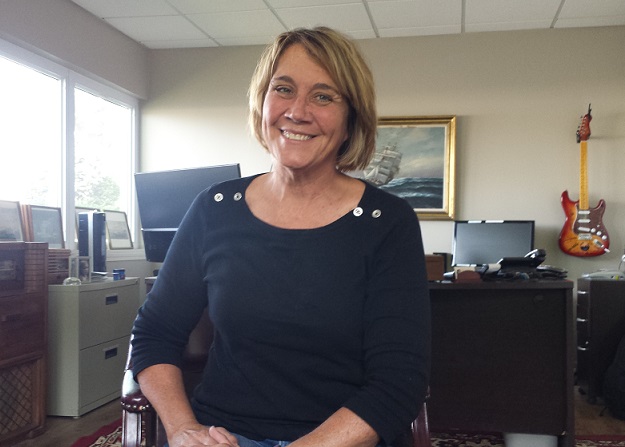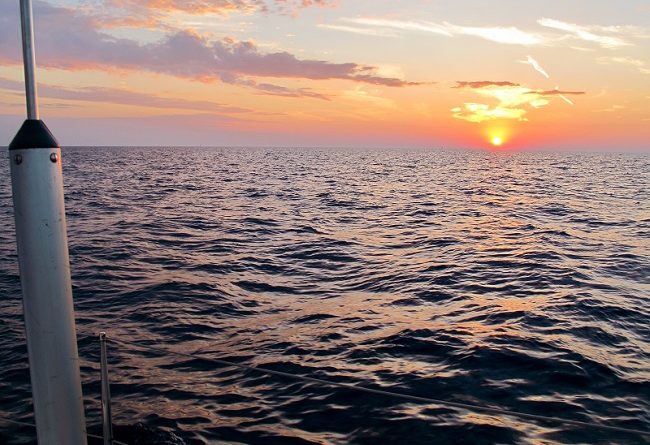March 11, 2018 – Healthy Water, Soils, Lands and Laws
![]() The last time that horticulturist and queen of all media Melinda Myers was on this show was in August of 2017, shortly after she had been inducted into the Hall of Fame for what used to be the Garden Writers Association, but is now called GWA: The Association for Garden Communicators. Since I am honorary chair of the Persona Non Grata Committee, I suspect that I will not be receiving one of those awards.
The last time that horticulturist and queen of all media Melinda Myers was on this show was in August of 2017, shortly after she had been inducted into the Hall of Fame for what used to be the Garden Writers Association, but is now called GWA: The Association for Garden Communicators. Since I am honorary chair of the Persona Non Grata Committee, I suspect that I will not be receiving one of those awards.
Nonetheless, I don’t hold that against Melinda and, as you can see, I even have her appear on my show on a semi-regular basis. She’s very smart, accomplished and actually very nice, and I don’t hold that against her, either.
Among her accomplishments, she hosts the nationally-syndicated Melinda’s Garden Moment program, airing on more than 120 TV and radio stations throughout the United States. Myers also hosts the internationally distributed Great Courses “How to Grow Anything” DVD series, including the latest Food Gardening for Everyone DVD set.
She’s a longtime columnist and contributing editor for Birds & Blooms magazine and writes the twice monthly “Gardeners’ Questions” newspaper column. Myers writes a regular column for Chicagoland Gardening and Wisconsin Gardening magazines, and she has written more than 20 gardening books, including Can’t Miss Small Space Gardening and the Midwest Gardener’s Handbook.
 Melinda will be in town this week to speak at the Chicago Flower & Garden Show on Wednesday, March 14 at 10:45 a.m. The title of her presentation is Designing a Pollinator Garden – Create the Scene and Attract the Characters for this Flower Garden Tale’s Happy Ending! It’s possible that Melinda is hoping to win another award, this time for longest title for a garden talk. However, the title for my talk at the Flower & Garden Show last year was Everything You Know About Gardening Is Wrong: Myths, Misinformation and Well-Meant, but Inaccurate Advice from Mom, the Intertubes and Beyond, which beats her title by two words. Just sayin’.
Melinda will be in town this week to speak at the Chicago Flower & Garden Show on Wednesday, March 14 at 10:45 a.m. The title of her presentation is Designing a Pollinator Garden – Create the Scene and Attract the Characters for this Flower Garden Tale’s Happy Ending! It’s possible that Melinda is hoping to win another award, this time for longest title for a garden talk. However, the title for my talk at the Flower & Garden Show last year was Everything You Know About Gardening Is Wrong: Myths, Misinformation and Well-Meant, but Inaccurate Advice from Mom, the Intertubes and Beyond, which beats her title by two words. Just sayin’.
Depending on time constraints this morning, we might also talk about jump starting the growing season, Hugelkultur. lasagna gardening, and who knows what else.
By the way, Peggy and I will be making several appearances at the at the Chicago Flower & Garden Show. We will be doing Facebook live videos during the opening night charity event Evening in Bloom on March 13. Then, on Friday, March 16, we will do a joint presentation called What’s Important and How To Find It at 11:30 a.m. That’s basically a primer on how to find good, reliable sources for gardening information. Finally, as we did last year, we we will broadcast The Mike Nowak Show live from Navy Pier on Sunday, March 18, at our usual time of 9-11am.
We in the United States live in a nation of natural wonders. Thanks to the work and forward thinking of people like Theodore Roosevelt, John Muir, Margaret Murie and countless others, the forests, lakes, marshes, prairies, mountains and other habitats, plus the flora and fauna that were enjoyed by our grandparents and great grandparents, still exist, to one degree or another.
That work never ends and, over the years, we have come to understand that protections need to be applied not just to wilderness areas but to urban ones, too, as witnessed by a law signed into being on January 1, 1970 by none other than President Richard Nixon. In a brilliant article about the National Environmental Policy Act (NEPA) in a publication called Mountain Journal that he created, Todd Wilkinson writes,
Even on a U.S. Department of Energy website, one that hasn’t yet been scrubbed by the Trump Administration, NEPA is referenced as “the Magna Carta” of environmental laws, the one that laid down the foundation, in fact, for all modern environmental laws in the land; laws that have safeguarded the health of millions of people, brought species back from the brink, ensured that water flowing from land, river or lake to the tap is safe to drink and air good to breathe, that kids weren’t ingesting lead paint or being exposed to toxins, and that acid rain isn’t killing forests and lakes.
Point of fact, the kind of environmental protection that has resulted from NEPA has been a boon for the economy and laid down a bedrock for conscientious capitalism to thrive.
He adds,
NEPA is considered the most forward-thinking environmental protection law in the world.
Welcome to 2018, where our own government is determined not just to gut the lynch pin of our environmental protections, but to make a mockery of it. Adam Federman, a writer for The Investigative Fund at The Nation Institute, has been on The Mike Nowak Show a couple of times in the past several months. His series of stories, including The Plot to Loot America’s Wilderness, reveals that government agencies like the Department of the Interior, which in the past had multiple missions, have shifted their focus almost exclusively to exploitation of natural resources.
This was brought home locally to me when in February I received a newsletter from Openlands. The subject line was “Impacts of the Federal Budget and Infrastructure Plan.” It refers to the proposed White House budget for 2019 which, to understate the case, is not good for environmental programs. Openlands lists some of the various initiatives that take a hit under the proposal.
- Funding for the National Heritage Areas (NHAs) is eliminated. NHAs protect the history, culture, ecology, and landscapes of many important regions in our nation’s history such as I&M Canal National Heritage Corridor.
- Funding for the Great Lakes Restoration Initiative (GLRI) is reduced by a crippling 90%. The GLRI is an eight-state, binational, bipartisan effort to clean up polluted areas left by our region’s industrial legacy and restore them to their natural conditions.
- Funding for the National Wildlife Refuge System is significantly reduced. Since 2012, Openlands has been working to establish Hackmatack National Wildlife Refuge along the Illinois-Wisconsin border. Projects in support of this 11,500-acre refuge will certainly be affected.
And that’s just the proposed budget. The Trump administration also announced an infrastructure plan, though that effort seems to have run into a brick wall. Nevertheless, that plan is no friend to our environment, either. Openlands notes that damage would be caused by
- The elimination of environmental reviews of infrastructure projects through the National Environmental Policy Act [More about NEPA here.]
- The removal of Clean Water Act environmental reviews of projects that fill wetlands or dump pollutants into waterways
- The authorization for Federal agencies to take any Federal lands, including National Parks, for road and pipeline projects without review
Openlands helps you to contact your local representatives on this form.
President and CEO Jerry Adelmann joins us on the program this morning to discuss the immediate and long range future of the programs and institutions that have preserved our lands and kept us safe. He will also bring us up to date with the merger of Conserve Lake County into Openlands, which happened at the beginning of the year. And now Openlands is introducing the Conservation@Home service in Lake County.
Last week, Peggy and I talked to Jim Slama, founder of the Good Food EXPO, a presentation of Family Farmed, now in its 14th year. As we explained on that show, there is a pre-conference farmer training session on Thursday, March 22, then the Friday Good Food Trade Show: Production, Policy & Industry Exchange, which focuses on key business and policy issues affecting the Good Food market. Peggy and I will be there to stream live interviews on Facebook as we talk to the policy movers and shakers, including experts on regenerative agriculture and the winners of the Good Food Business of the Year and Beginning Farmer of the Year.
 Saturday is the Good Food Festival, featuring the delightful chaos of the vendors at the Good Food Commons, in addition to seminars, workshops, chef demonstrations and more. And, again, you will find Peggy and me there, so stop by and say hello.
Saturday is the Good Food Festival, featuring the delightful chaos of the vendors at the Good Food Commons, in addition to seminars, workshops, chef demonstrations and more. And, again, you will find Peggy and me there, so stop by and say hello.
But getting back to the Friday sessions, one of the presenters will be David R. Montgomery, a MacArthur Fellow and professor of geomorphology at the University of Washington. He is an internationally recognized geologist who studies landscape evolution and the effects of geological processes on ecological systems and human societies.
At 10am on Friday, Dr. Montgomery speaks about his groundbreaking work, Growing a Revolution: Bringing our soil back to life at the Good Food Impact Talks.
Then at 10:15, he will be part of the Opening Symposium: Organic “Plus”: A discussion of what the Regenerative Organic Agriculture Certification Brings to the Table. According to the symposium description,
Organic is the gold standard, but can more be done to improve soil health, animal welfare, and worker fairness? Industry leaders discuss the regenerative organic certification, what it means, how it can be economically viable for farmers, and the importance of labeling and marketing to avoid consumer confusion.
At 12:15, he will be part of another panel–Healthy Soil, Healthy Plants, Healthy People
The soil beneath our feet is the reason we are alive, yet too often we treat it like dirt. Our panelists will explore the many ways that soils have been eroded and degraded and the ways they can be rebuilt and restored. The panel will also connect the health of the soil to the health of plants, animals (including us), ecosystems, and the earth itself.
We’re pleased to have David R. Montgomery on the show this morning to talk about the health of our soil.


